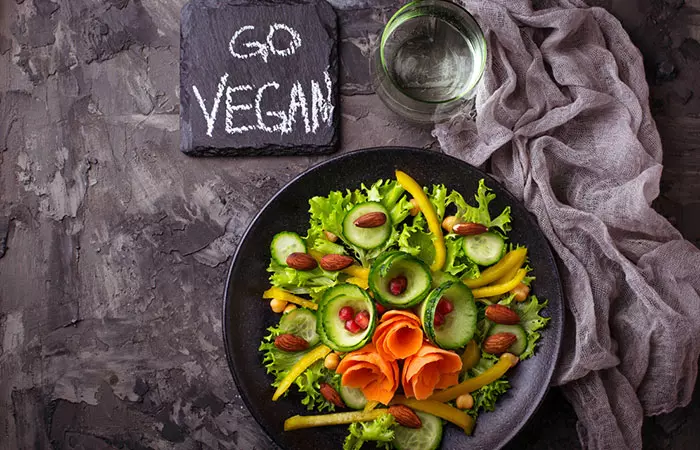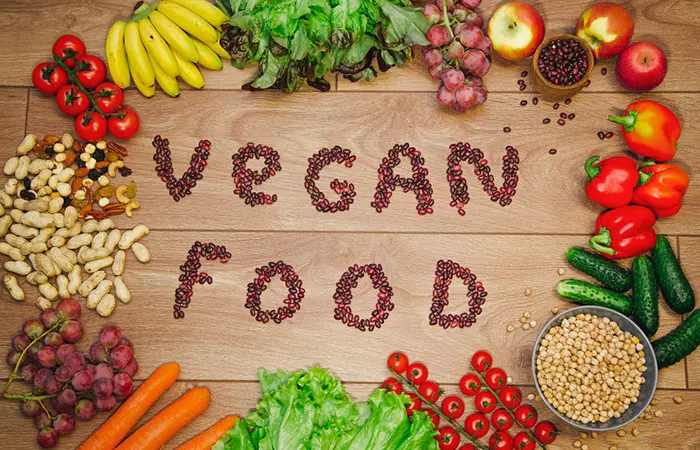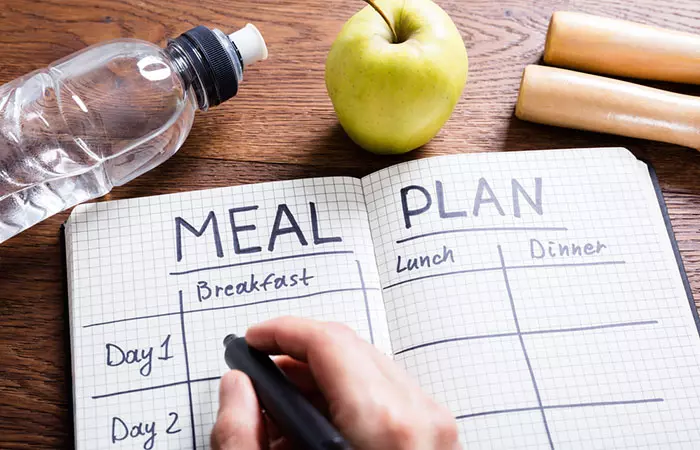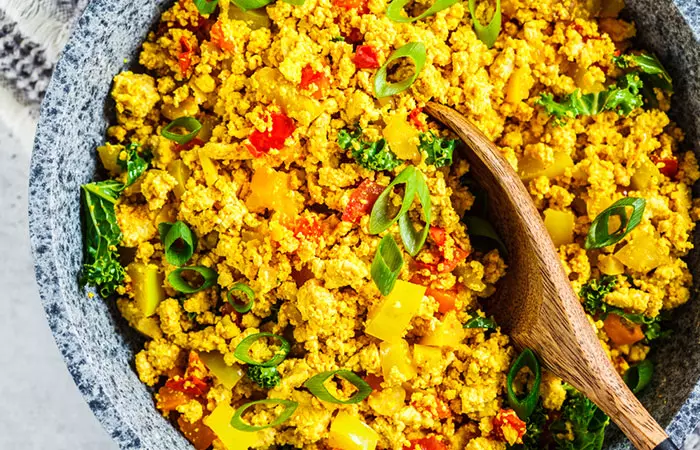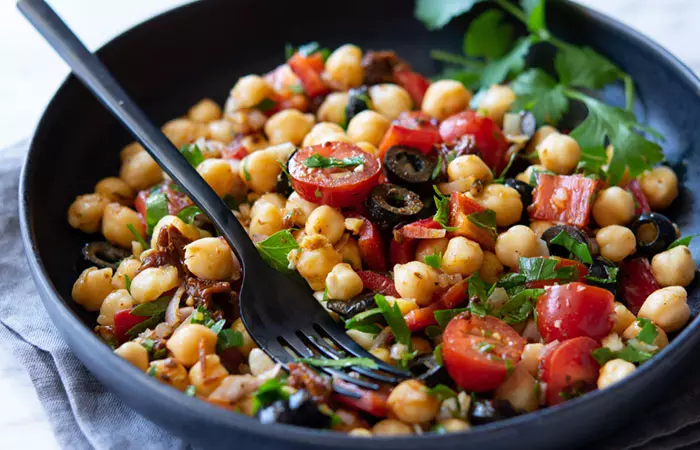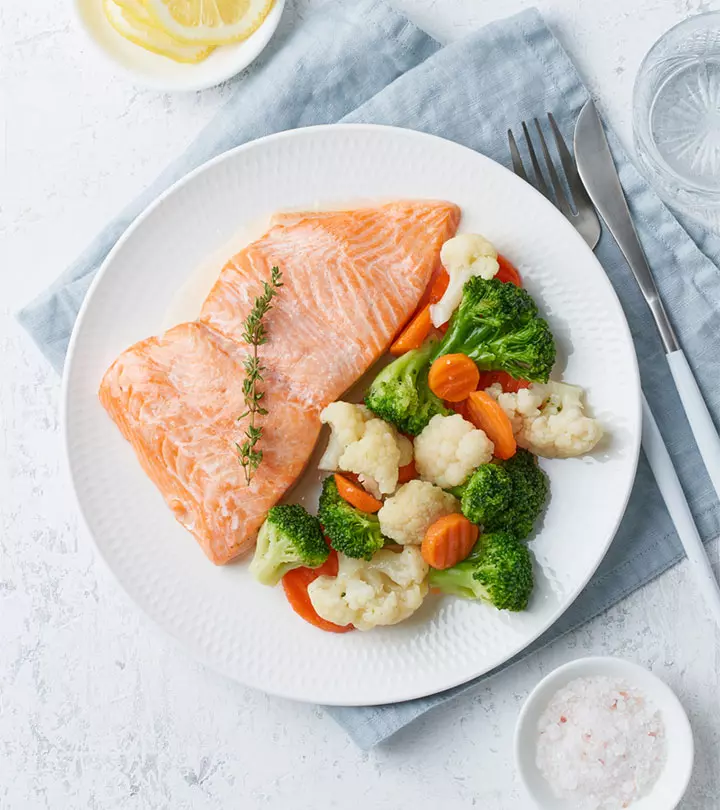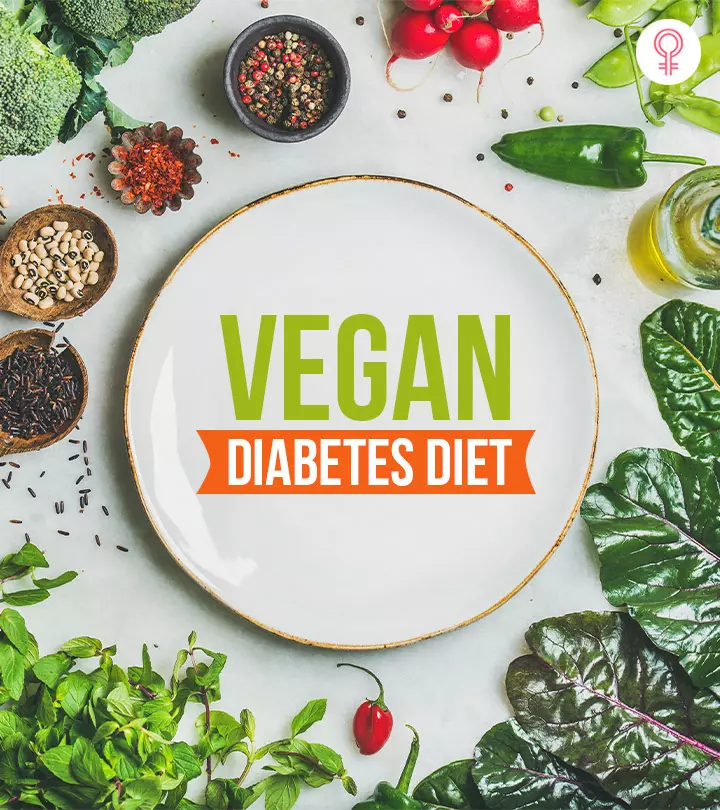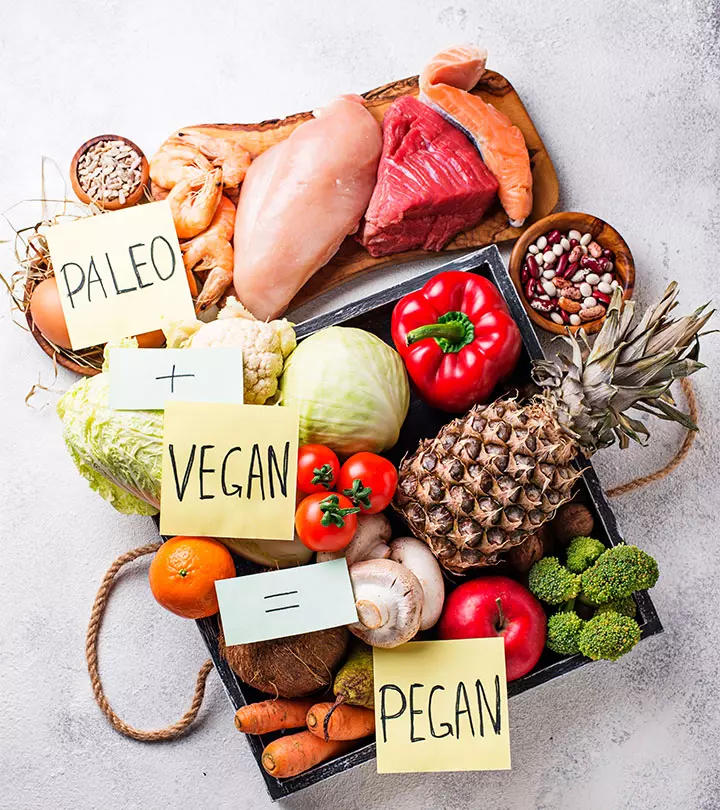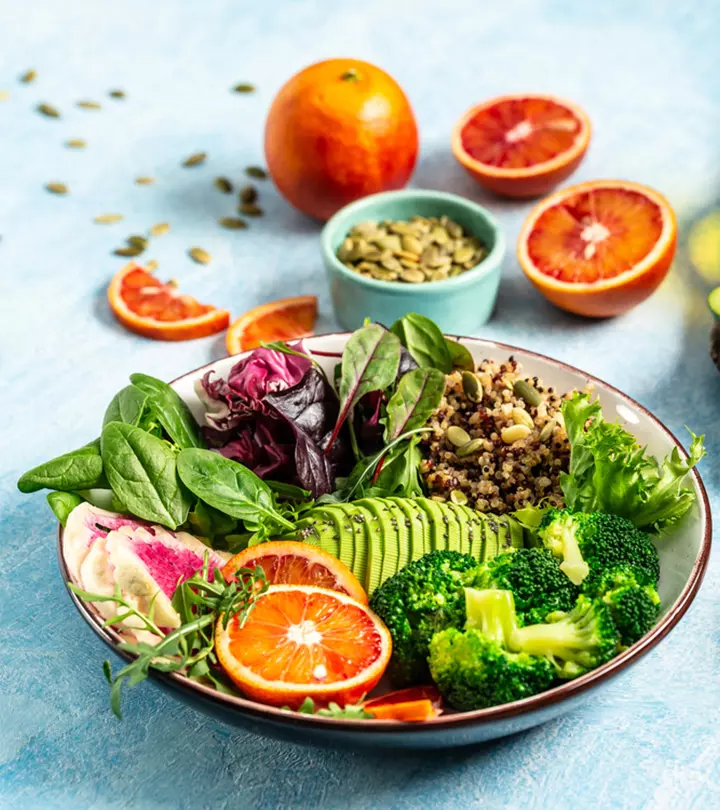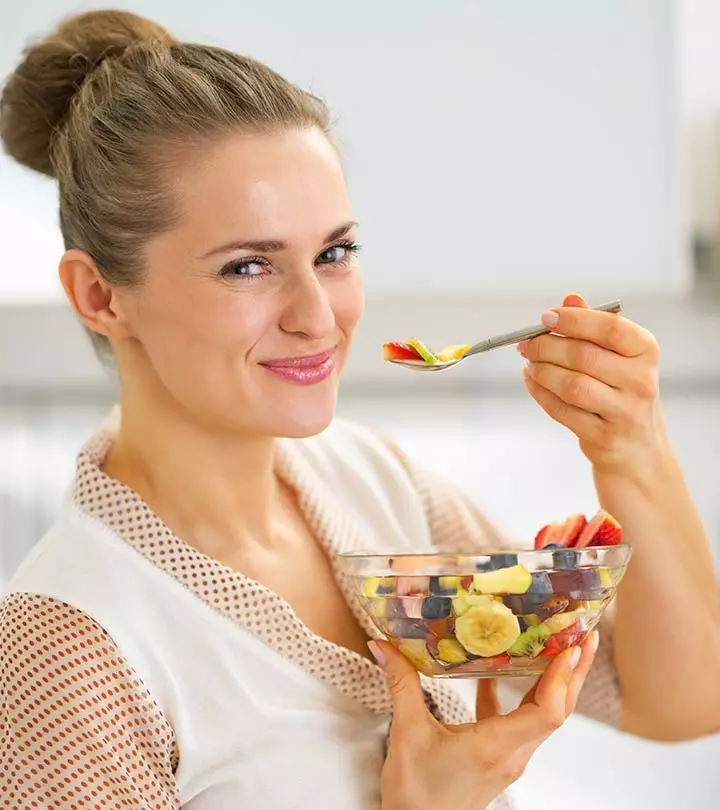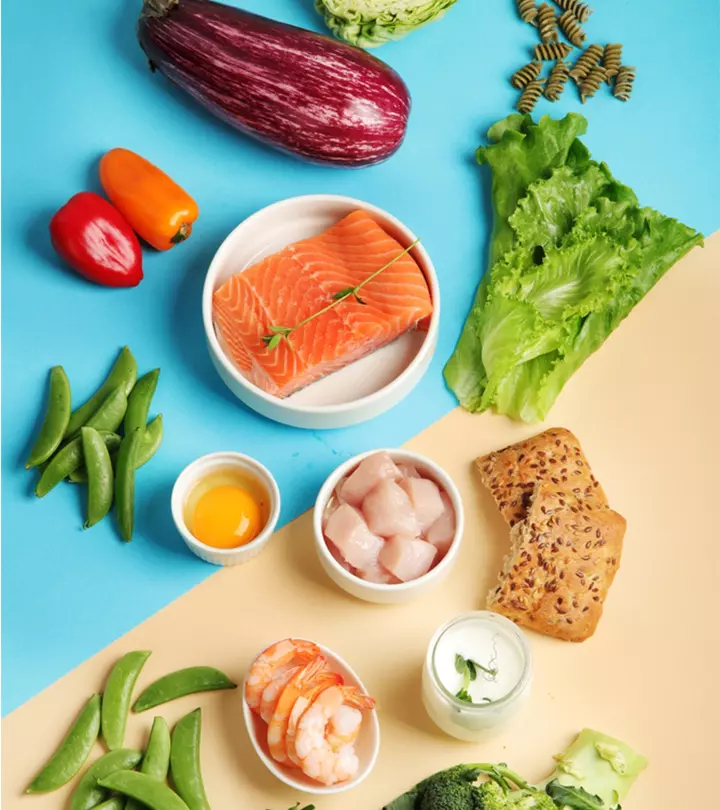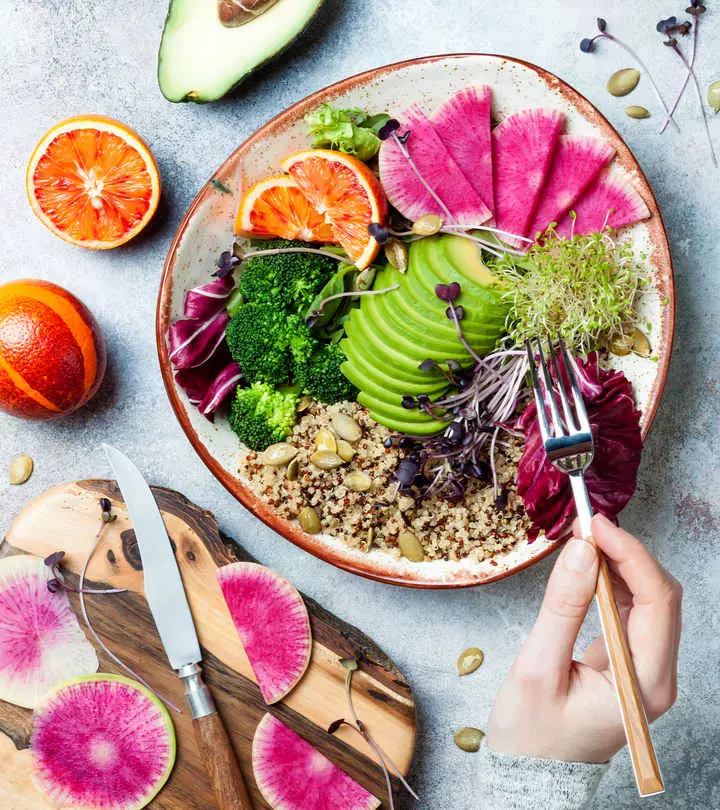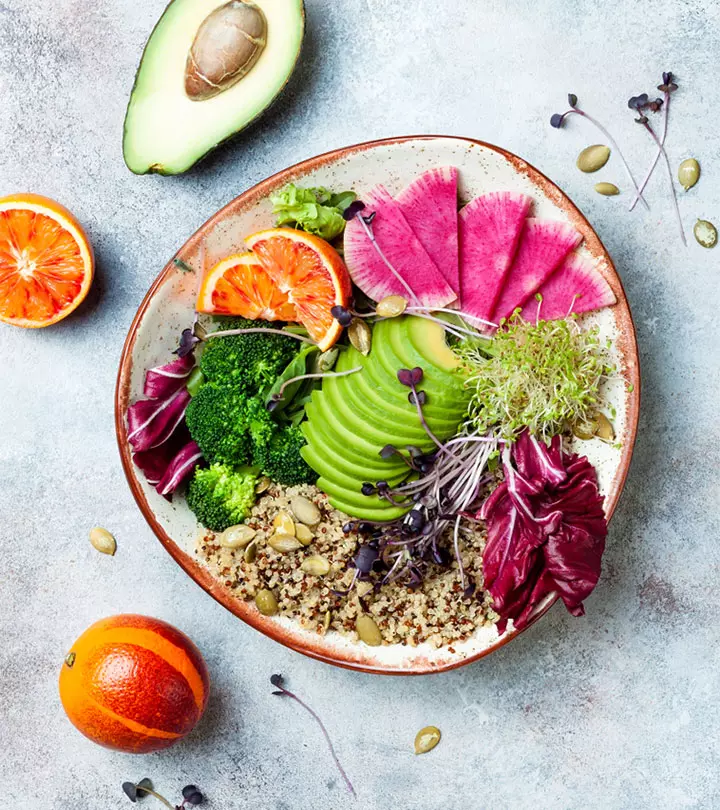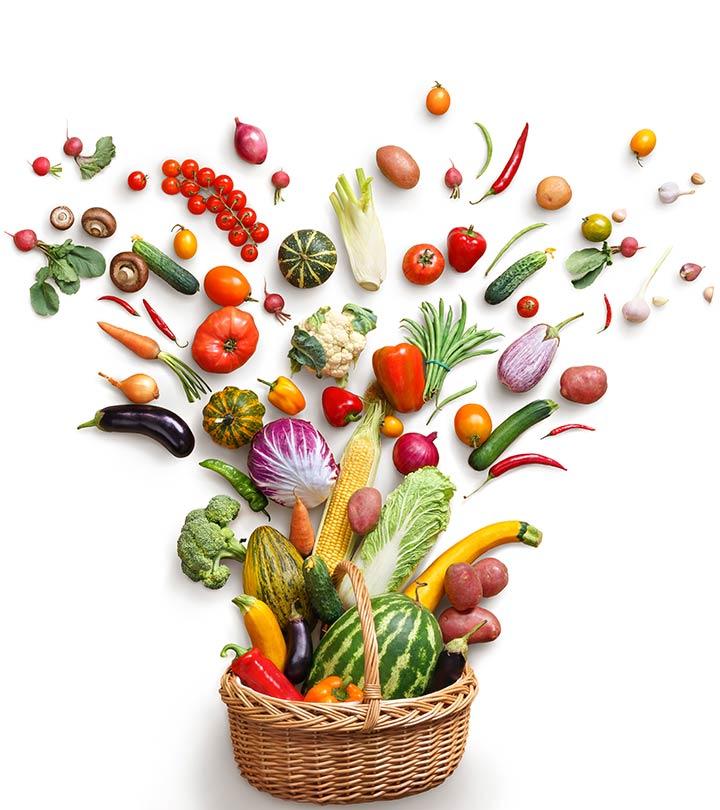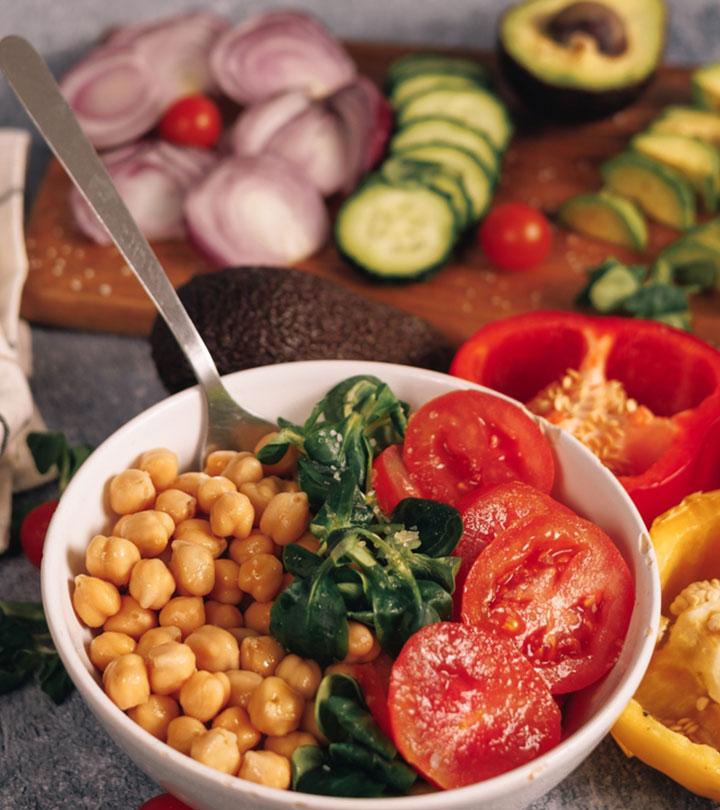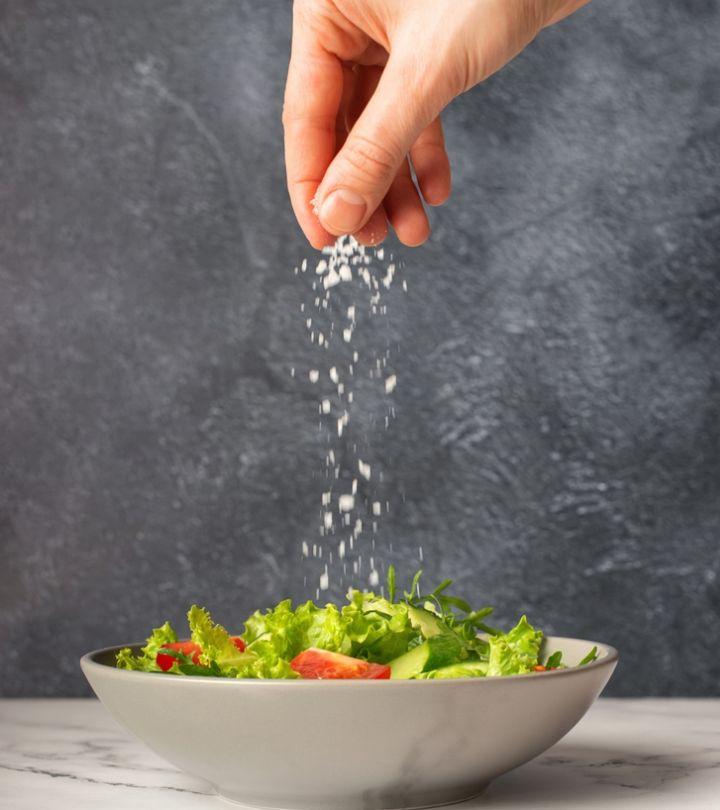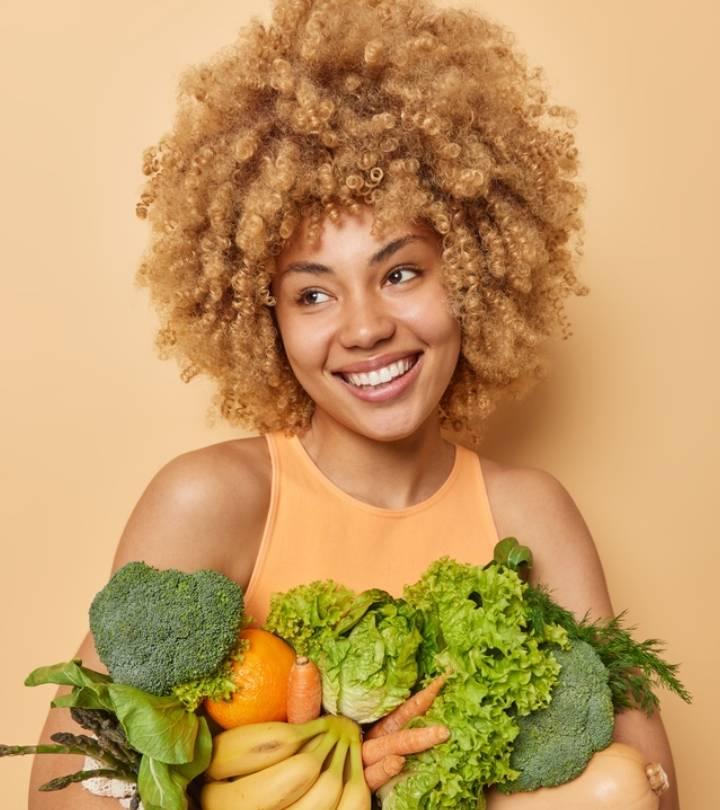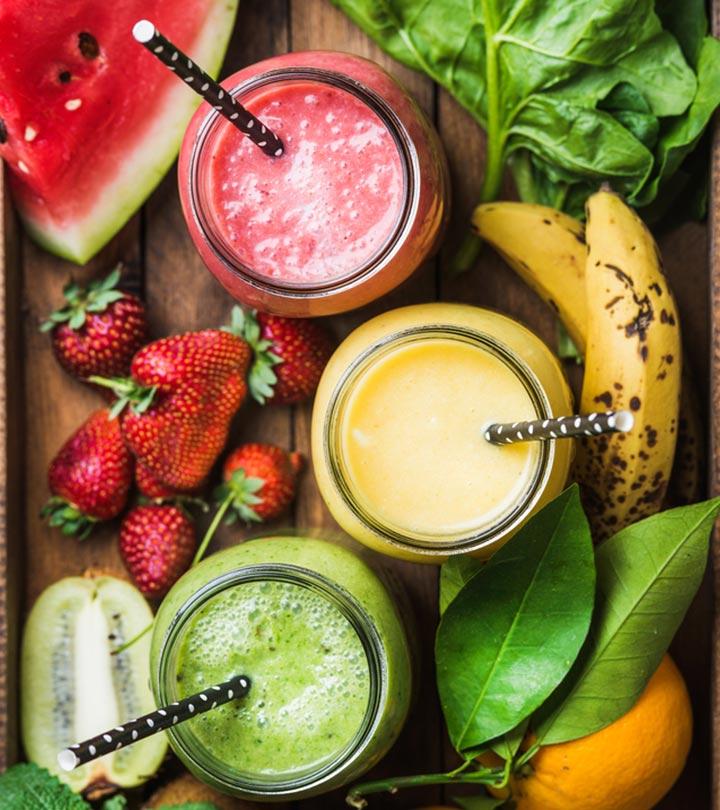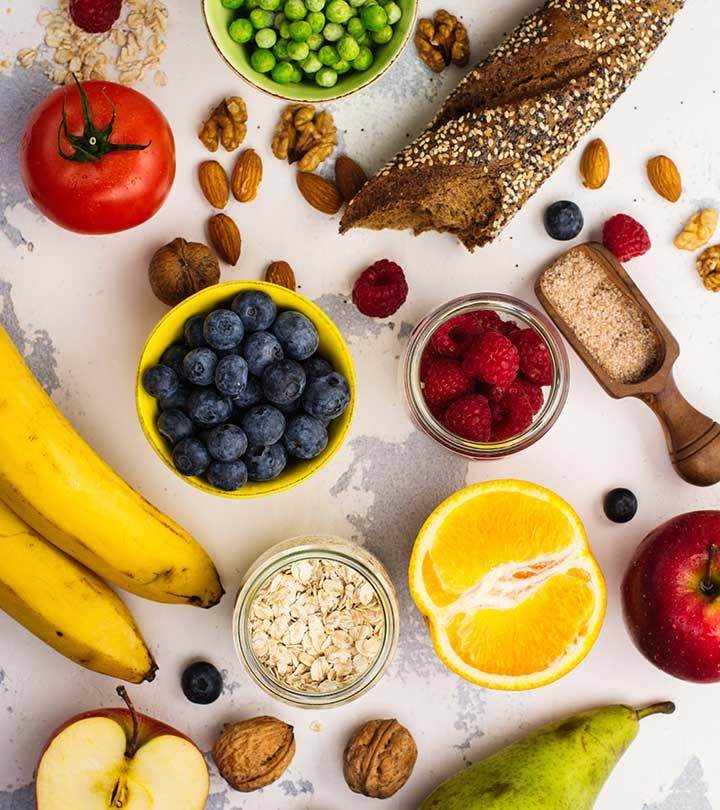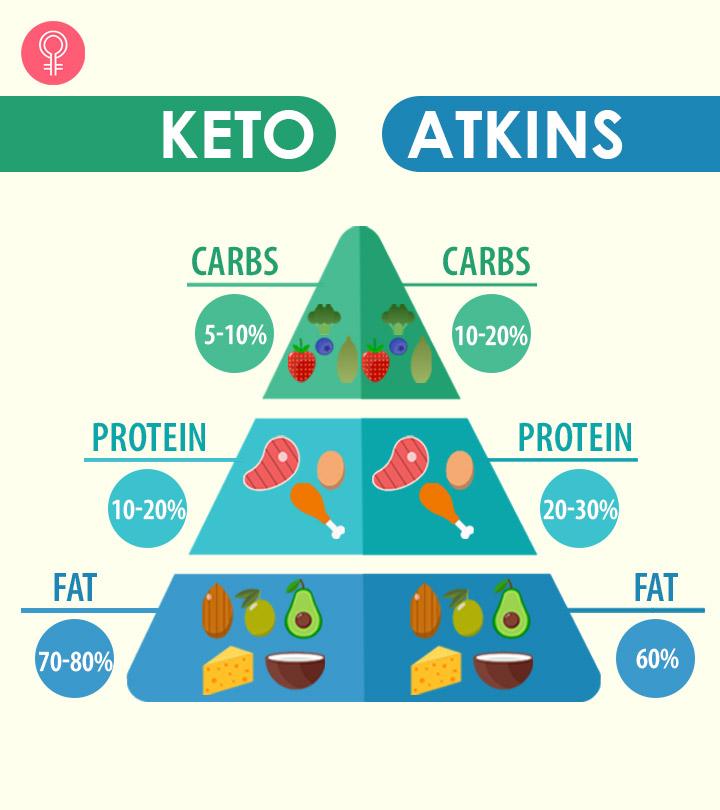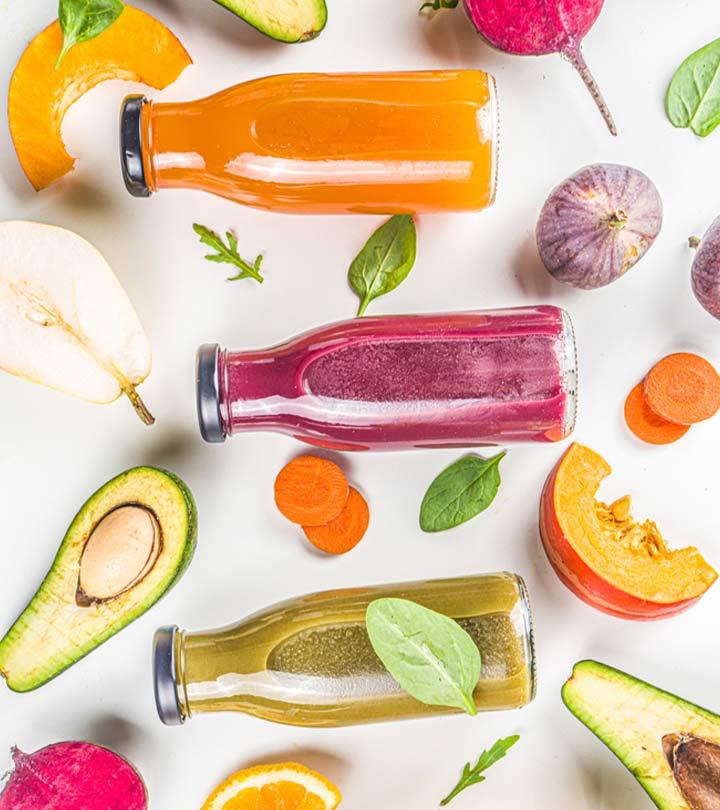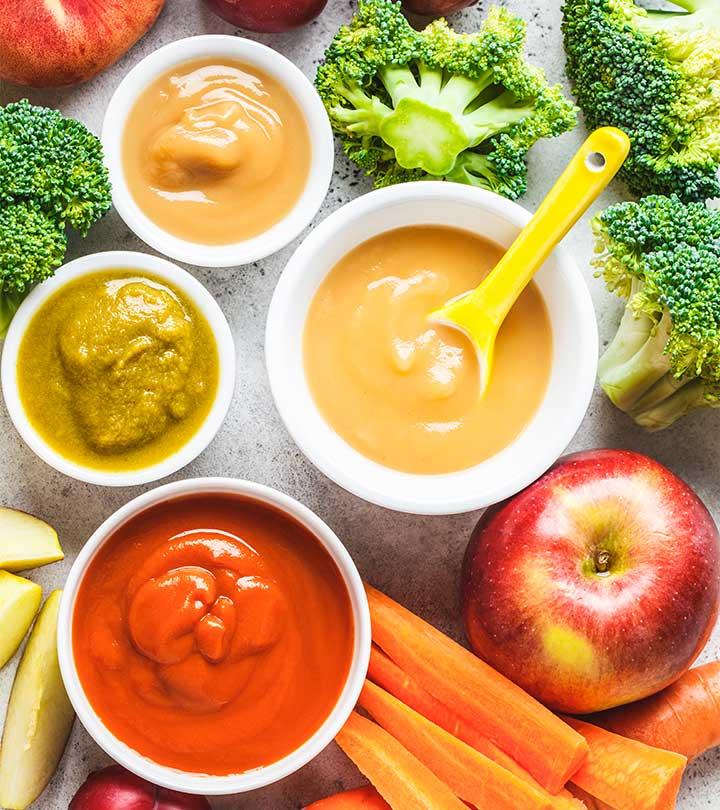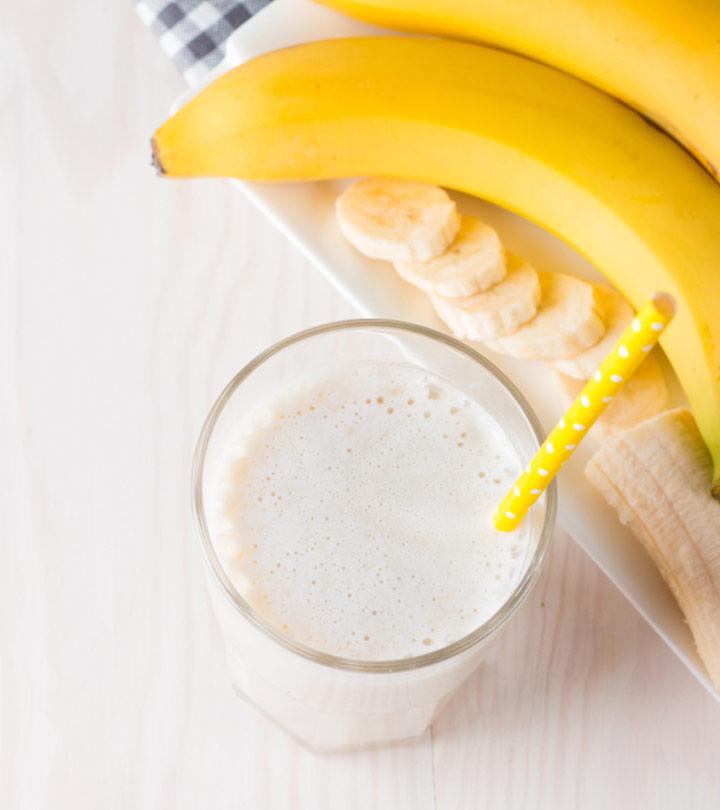Vegan Diet: Health Benefits, Foods To Eat And Avoid
Fill your plate with delicious, plant-powered goodness for a healthier you.
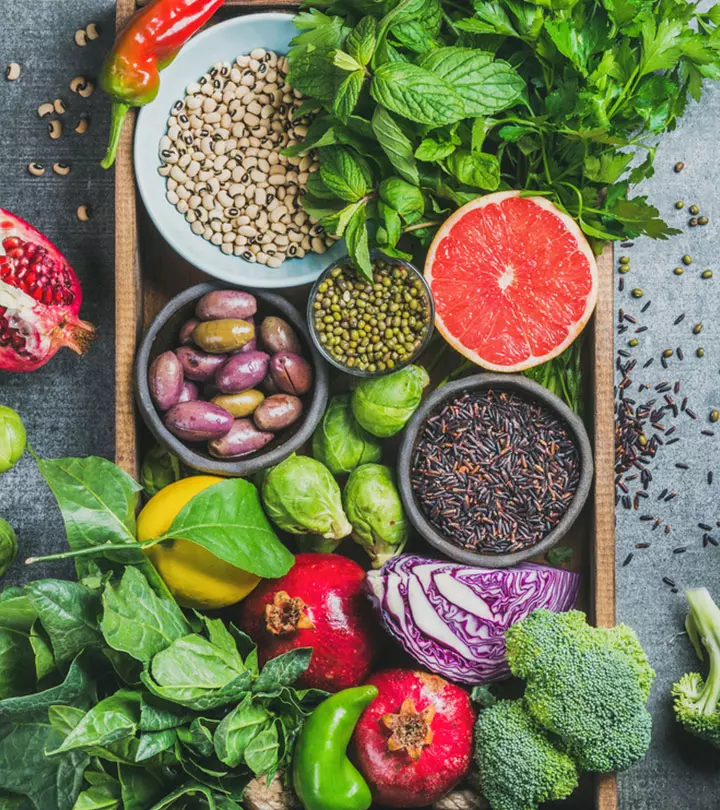
Image: Shutterstock
The vegan diet has been slowly gaining momentum as a dietary approach worldwide. It emphasizes consuming whole, plant-based foods that offer many health benefits, including better heart health and sustainable weight loss.
The diet has attracted extensive attention due to its stand on animal cruelty, which is often caused by the production of animal-based products. It also is thought to promote environmental stability.
Whether you are considering a vegan diet for animal welfare, health, or environmental reasons, it is important to understand how it can affect your lifestyle before you decide to adopt it. In this article, we discuss everything you need to know about the vegan diet, including the different types, benefits, cons, meal plans, and recipes. Continue reading.
 At A Glance: Vegan Diet
At A Glance: Vegan Diet- Principle: Intake of only plant-based foods and elimination of all animal-based foods, including dairy and eggs
- Purpose: To promote overall health, reduce environmental damage, and promote animal welfare
- Who It Is For: Anyone who wishes to lose weight, improve their health, and reduce animal cruelty and their carbon footprint
- Duration: Long-term
- Who Should Avoid: Anyone with nutritional deficiencies like that of vitamin B12, iron, zinc, and calcium
- Cons: May cause nutritional deficiencies, may be hard to follow due to family or religious customs associated with food, and can be expensive
In This Article
What Is Veganism?
Veganism is a lifestyle and dietary choice that restricts the exploitation of animals for culinary, clothing, and other purposes. Vegans, or people who follow veganism, do not consume meat, fish, dairy, and eggs or use animal-derived products such as leather and fur. They also avoid using cosmetics tested on animals or products that may have been procured through animal exploitation or harm.
Veganism is the strictest form of vegetarianism. People who decide to opt for this lifestyle follow the vegan diet. Let us learn more about this diet in the following section.
What Is A Vegan Diet?
A vegan diet is a type of vegetarian diet that eliminates all animal products, including meat, dairy, eggs, honey, and gelatin. People follow this eating pattern for various reasons, including ethical concerns about animal welfare and environmental considerations. The diet is also known for the potential health benefits associated with plant-based diets, such as lowered cholesterol levels and a reduced risk of cardiovascular disease (1). However, veganism also has potential risks that we discuss in a later part of this article.
The vegan diet, just like other omnivorous diets, offers a range of choices and variations. You can find some of these in the following section.
Different Types Of Vegan Diets
The most common types of vegan diets are:
- The Whole Food Vegan Diet: It excludes processed foods like added sugars, white flour, and refined oils and relies on plant foods such as fruits, vegetables, legumes, and whole grains.
- The Raw Food Vegan Diet: This diet works on the premise that raw or minimally heated foods are more nutritious than cooked foods. It recommends the intake of raw fruits and vegetables or plant foods cooked below 118°F.
- The Raw Till 4 Diet: It promotes the consumption of raw foods until 4 in the evening, followed by a cooked plant-based meal for dinner. The diet is high in carbohydrates and low in fats and proteins.
- The 80/10/10 Diet: It promotes the intake of raw fruits and soft greens and limits fat-rich fruits/veggies like avocados. This low-fat, raw vegan diet suggests that 80% of your calories should come from carbs and the remaining 10% each from proteins and fats.
- The Starch Solution Diet: It relies on cooked starches such as rice and potatoes and limits fat-rich plants like avocados. The diet consists of 70% starch, 20% vegetables, and 10% fruits.
- The Junk Food Vegan Diet: It relies on mock meat and cheese and other heavily processed vegan foods like fries and dairy-free desserts. This diet can cause health issues like weight gain as it is high in calories, sugar, and unhealthy fats and low in nutritional value.
While a vegan diet can be a healthy and sustainable way of eating, the same is not true for all its variations. For instance, the Junk Food Vegan Diet might not be the best approach if you wish to lose weight. Hence, pay careful attention to nutrition to ensure the diet fulfills your dietary requirements.
Both vegans and vegetarians follow a plant-based dietary approach. But how are they different? We will explore the same in the next section.
Vegans Vs. Vegetarians
While vegans do not eat any products that come from animals, including dairy products and eggs, vegetarians may consume dairy products, eggs, or both. This means that dieting as a vegan is more restrictive than dieting as a vegetarian. Hence, vegans also are often at a higher risk of deficiencies in vitamin B12, vitamin D, and calcium (2). However, vegan dietary practices are also linked with numerous health benefits, such as a decreased risk of metabolic syndromei A medical term for conditions such as high blood pressure that increase the risk of heart disease and diabetes. and cardiovascular disease (1).
Both the vegan and vegetarian diets are healthy. A vegetarian approach might be ideal for you if you cannot do without dairy and eggs. Alternatively, you may go vegan if you can give up on them.
 Did You Know?
Did You Know?The health benefits of adopting a vegan diet are many. From boosting your heart health to helping you with weight management, the diet can benefit you in numerous ways. Let us understand more in the next section.
Health Benefits Of Vegan Diets
- May Reduce Blood Sugar Levels
Consumption of plant-based foods like whole grains, legumes, fruits, and vegetables and the elimination of animal products may reduce the risk of type 2 diabetes. A low-fat, plant-based diet was also found to possibly improve serum glucose concentrations, body weight, and blood pressure in individuals with type 2 diabetes (5).
- May Lower Cholesterol And Promote Heart Health
Plant-based diets, when compared with a meat-based diet, may possibly help reduce total and LDL (bad) cholesterol levels more effectively (1). This, in turn, may benefit your heart health and reduce the risk of ischemic heart diseasei A condition characterized by reduced blood flow to the heart muscle due to narrowed arteries that may eventually cause a heart attack. (3). However, some other research suggests that vegans may be at a slightly higher risk of ischemic heart disease when compared to those who consume animal products (4). Hence, further research is warranted in this regard.
- May Reduce The Risk Of Cancer
According to a study, plant-based diets may provide protection against cancers of the digestive system, including pancreatic cancer (6). However, another review of the association between plant-based diets and cancer mortality shows that the evidence is limited (7).
- May Aid In Weight Loss
Limiting the consumption of meat and dairy products may boost your overall health due to reduced calorie density and cholesterol intake (8). Vegan diets may be ideal for weight loss and weight management as they eliminate these calorie-dense animal products. In addition, they may also be beneficial for individuals with type 2 diabetes and arthritis (8). However, further research is needed to support these claims.
- May Improve Gut And Digestive Health
Adequate intake of dietary fiber may help prevent constipation (9). Since a vegan diet is rich in fiber from fruits, vegetables, and whole grains, it may help with the same. Research also suggests that switching to a plant-based diet, such as a vegan diet, may increase the diversity of health-promoting gut bacteria (10).
In addition to these benefits, another study suggests that plant-based diets may benefit your kidney health. However, this study was conducted on plant-based diets in general and not specifically on vegan diets (11).
Weight loss is one of the many benefits of the vegan diet. Are you looking to lose a few inches through the vegan diet? The following section will give you more details.
Weight Loss From A Vegan Diet
A vegan weight loss diet can be an effective way to shed some extra pounds. However, it is important to note that the impact of a vegan diet on an individual’s weight depends on various factors, including their overall calorie intake, food choices, and lifestyle.
- Food Choices And Calorie Intake
A vegan diet does not always mean low calorie intake. You are bound to gain weight if you consume too many processed plant-based foods like fries, burgers, cookies, and cake. Hence, you must instead focus on consuming larger portions of nutrition-dense foods like fruits and vegetables that are low in calories.
- Portion Sizes
Pay attention to portion sizes and avoid overeating. A study shows that portion plates could be a promising tool for supporting healthy dietary behaviors (12). Most of them follow a common proportion of dividing half the plate for vegetables and a quarter each for protein and carbohydrates.
- Healthy Lifestyle
In addition to the right food choices and portion control, weight loss also requires a healthy lifestyle. Engage in regular physical activity and stay hydrated to complement your dietary efforts. Also ensure a proper sleep pattern, as better sleep health is associated with greater weight loss (13).
Going vegan involves making a commitment to exclude all animal products and by-products from your diet and lifestyle. This involves a process, and we discuss the same in the next section.
How To Go Vegan And How Does It Work?
Veganism involves adopting a lifestyle and dietary choices that forbid the intake and use of animal-based products and animal-derived materials, respectively. Here is what you can do.
- Start by educating yourself about veganism and the ethical and health benefits of choosing this lifestyle.
- Transition into the diet by designating certain days or meals as vegan and gradually increasing the frequency.
- Learn about plant-based sources of protein such as tofu and tempeh, dairy alternatives such as almond milk and soy yogurt, and other vegan pantry staples such as quinoa and nutritional yeast.
- Plan your meals ahead of time to ensure a well-balanced diet, and keep your kitchen stocked with vegan essentials like grains, vegetables, and lentils.
- Pay attention to food labels to ensure your packaged food has no non-vegan ingredients like dairy, eggs, or gelatin.
- Look for vegan-friendly restaurants in your area or when you travel if you are eating outside.
- Consider taking supplements or eating fortified foods to meet your nutritional requirements for vitamin B12, calcium, and omega-3 fatty acids.
- Connect with like-minded communities online or offline for support, advice, and recipe ideas.
According to a survey conducted on 8,397 U.S. adults between the ages of 18-64, the percentage of people following the vegan diet among Gen Z and millennials was similar. However, the prevalence of veganism among Generation X and baby boomers was comparatively low. Check out the graph below for more details.
Percentage Of U.S. Vegan Individuals In 2022
Source: Statista Did You Know?
Did You Know?Transitioning to a vegan diet is a personal choice and a complete journey in itself. The first step in this journey is gaining a complete understanding of what foods to eat and what to avoid. Learn more in the next section.
Vegan Diet Food List
- Foods To Eat
| Category | Examples |
| Fruits | Apple, banana, orange, mango, and all other fruits |
| Vegetables | Kale, carrot, potato, cauliflower, zucchini, and all other vegetables |
| Plant-Based Proteins | Soy products like tofu, tempeh, and edamame, and legumes like kidney beans, chickpeas, and lentils |
| Whole Grains | Quinoa, brown rice, and oats |
| Grain Products | Whole grain pasta and bread, rice noodles, and couscous |
| Nuts And Seeds | Almonds, walnuts, cashews, peanuts, chia seeds, flaxseeds, hemp seeds, and pumpkin seeds |
| Dairy Alternatives | Almond milk, soy milk, oat milk, coconut milk, and other non-dairy milk options, and yogurt, cheese, and butter made from plant-based ingredients |
| Plant-Based Oils | Olive, canola, coconut, sunflower, and other vegetable oils |
| Sweeteners | Brown sugar, maple syrup, agave nectar, jaggery, and date syrup |
| Herbs And Spices | Basil, oregano, garlic, ginger, turmeric, and all other herbs and spices |
| Condiments And Sauces | Mustard, ketchup, soy sauce, and other vegan-friendly sauces and dressings |
| Baking Supplies | Flour, baking soda and powder, cocoa powder, and other vegan-friendly baking staples |
- Foods To Avoid
| Category | Examples |
| Meat | Beef, pork, lamb, chicken, veal, poultry, and all other forms of meat |
| Seafood | Salmon, tuna, crabs, and other aquatic animals |
| Dairy Products | Milk, cheese, butter, yogurt, cream, and other dairy-derived products |
| Eggs | Chicken eggs, duck eggs, and other types of eggs |
| Sweeteners | Honey, refined sugar, and condensed milk |
| Other Animal-Derived Ingredients | Gelatin, casein, whey, lactose, and food colorings like carmine (red pigment from crushed insects) |
| Animal-Based Fats | Lard, tallow, ghee, and butter |
Proper meal planning can help you effectively organize your meals and ensure you meet your nutritional requirements. Check out the sample vegan diet plan below to get some inspiration.
7-Day Vegan Meal Plan
| Day | Breakfast | Lunch | Dinner |
| Day1 | 1 avocado and cherry tomatoes toast with 1 glass of orange juice | 2 cups of chickpea salad | 3 oz. of baked tofu with ½ cup of brown rice and 1 cup of green salad |
| Day2 | 1 cup of almond banana oatmeal | 2 cups of lentil soup with 1 cup of mixed greens | ½ cup of pea pesto spaghetti and 2 cups of sautéed veggies |
| Day3 | 1 glass of spinach, banana, and almond milk smoothie | 2 cups of quinoa vegetable salad | 1 cup of vegan chili with a slice of cornbread and 1 cup of salad |
| Day4 | 1 peanut butter and banana sandwich with 1 glass of green smoothie | 4-6 vegan sushi rolls with ½ cup of sauteed spinach | 1 cup of chickpea curry with 1 whole-wheat flatbread and 1 cup of salad |
| Day5 | 2-3 vegan pancakes topped with 1 chopped banana and a dollop of dairy-free yogurt | 1 vegan falafel and vegetable wrap | 1 cup of vegan Thai green curry with 3 oz. grilled tofu and ½ cup of jasmine rice |
| Day6 | 1 cup of kiwi and almond chia seed pudding | 2 cups of black bean and corn salad | 1 cup of vegan tofu scramble with 1 cup of sauteed spinach, mushrooms, and diced tomatoes |
| Day7 | 2 vegan blueberry muffins with ½ cup of mixed fruits | 1 cup of vegan vegetable and chickpea curry with naan bread and ½ cup of salad | 2 quinoa and black bean stuffed bell peppers with ½ cup of sauteed greens |
The vegan diet also allows you to enjoy snacks in addition to your regular meals. The following sections will take you through some lip-smacking snacking options that are light and healthy.
Healthy Vegan Snacks
Here are some healthy vegan snacks you can enjoy:
- 1 sliced cucumber with 1 tablespoon of homemade hummus
- 4-6 baby carrots with 1 tablespoon of homemade hummus
- 1 cup of colorful fruit salad
- A handful of nuts and seeds
- 1 whole grain rice cake with 1 tablespoon of nut butter
- 1 cup of air-popped popcorn
- 1 sliced apple with 1 tablespoon of nut butter
From colorful veggie-loaded salads to satisfying plant-based delicacies, the vegan diet has plenty of options you can choose from. The following section will introduce you to two amazing recipes. Check them out!
Healthy Vegan Recipe Ideas
- Tofu Scramble
Ingredients
- 1 tablespoon of olive oil
- 280 g extra firm tofu
- 100 g cherry tomatoes, halved
- 1 onion, finely chopped
- 1 large garlic clove, crushed
- ½ tablespoon of turmeric powder
- 1 tablespoon of cumin powder
- ½ tablespoon of sweet smoked paprika
- 1 teaspoon of salt
- ½ small bunch of parsley, chopped
- 3 ½ tablespoons of spring onions, chopped
How To Prepare
- Heat the olive oil in a frying pan and add the finely chopped onion to it.
- Fry for 8-10 minutes or until the onion turns golden brown.
- Add turmeric, cumin powder, garlic, salt, and paprika, and cook for 1-2 minutes.
- Roughly mash the tofu and add it to the pan, followed by chopped tomatoes.
- Cook for 5-6 minutes and turn off the heat.
- Add chopped parsley and spring onions and fold them through the mixture.
- Chickpea Salad
Ingredients
- 400 g chickpeas, boiled
- 2 tablespoons of coriander, roughly chopped
- 2 tablespoons of parsley, roughly chopped
- 1 onion, thinly sliced
- 2 tomatoes, chopped
- 2 tablespoons of black olives, sliced
- 1 tablespoon of olive oil
- 1 teaspoon of salt
- 1 teaspoon of pepper
- 1 lemon, juiced
How To Prepare
- Add chickpeas, onion, tomatoes, olives, parsley, and coriander to a bowl.
- Drizzle olive oil over the mixture and add salt, pepper, and lemon juice.
- Mix well and enjoy!
While adopting a vegan diet offers a multitude of health benefits and aligns with your ethical values, you also need to be mindful of certain nutrient deficiencies. Know more about them in the next section.
Nutrients Of Concern On A Vegan Diet
Studies show that people on a vegan diet may have a higher deficiency risk of certain nutrients when compared to their meat-eating counterparts (14), (15). These nutrients include:
- Vitamin B12
- Vitamin D
- Eicosapentaenoic acidi A healthy fat found in cold-water fatty fish like salmon that helps reduce heart disease risk and offers other health benefits. (EPA)
- Docosahexaenoic acidi A healthy fat found in cold-water fatty fish like salmon that helps maintain normal brain function in adults and infants. (DHA)
- Calcium
- Iron
- Zinc
- Iodine
Therefore, when you transition to a vegan diet, it is essential to keep track of your intake of the various micro- and macro-nutrients to reduce the risk of any deficiencies. You may use any calorie- or nutrient-tracking application for this purpose.
While a well-planned vegan diet can provide many of these nutrients, you may have to rely on supplements as well. The following section sheds more light on this aspect.
Supplements To Consider On A Vegan Diet
You may consider opting for the following supplements to reduce your risk of nutrient deficiencies.
- Vitamin B12
- Vitamin D
- Omega-3 fatty acids (EPA and DHA)
- Iron
- Calcium
- Zinc
You may also consider taking protein supplements. While most vegans can meet their protein needs through whole plant foods, you may opt for vegan protein powder supplements made with soy, peas, or almonds if you have a higher protein requirement.
However, do note that not all vegans may need these supplements. Your nutrient needs depend on several factors like your age, gender, and underlying health conditions. Hence, always consult your healthcare provider before taking any supplements.
The vegan diet may also pose certain social challenges that can vary depending on your culture, family, and social contacts. Know more about these in the next section.
Social Challenges Of A Vegan Diet
- It can be challenging to find vegan-friendly restaurants or get-togethers.
- You may feel socially isolated during gatherings where animal products are the primary food options.
- You may encounter negative stereotypes about your diet, such as being labeled as preachy or overly restrictive.
- In some regions, vegan options may be limited or less diverse and lead to a monotonous diet and feelings of exclusion.
- Most cultural traditions often revolve around food, and going against them by adopting a vegan diet may create friction within the family.
While these challenges may feel overwhelming at first, the ethics of the vegan diet and its health benefits sure do outweigh them. But does this diet have any other drawbacks? Let us find out.
Possible Drawbacks Of A Vegan Diet
- Allergies or sensitivities to certain vegan foods such as nuts, soy, or gluten can severely limit your food choices.
- Some vegan products, such as specialty meat alternatives, can be more expensive than their non-vegan counterparts.
- Preparing balanced vegan meals from scratch may require more planning, which may not be ideal for those with busy lifestyles.
While there is nothing you can do about your food sensitivities, you can easily tackle other problems. For instance, instead of consuming specialty meat alternatives, you can try other recipes involving your regular fruits and vegetables. Also, if you have a busy lifestyle, try meal prepping on the weekends for the entire week.
Infographic: A Quick Guide To The Vegan Diet
Transitioning to a vegan lifestyle can be a healthy and compassionate choice. However, it can also be challenging at first. From the foods you can eat to the ones you need to avoid, there are several things you need to be mindful of if you are going vegan. The following infographic provides you with a quick guide to the vegan diet. Check it out!

Illustration: StyleCraze Design Team
A vegan diet has numerous health benefits. It may help keep your heart healthy, manage high blood pressure and cholesterol, and reduce the risk of type 2 diabetes. However, as with any diet, these benefits only come into effect if you are consistent with the plan. If you are following the vegan diet for weight loss, you also need to combine it with other healthy lifestyle practices like portion control, daily exercise, and adequate sleep. You should also build your plant-based diet around nutrient-rich foods and avoid heavily processed foods. In addition, if you cannot meet your daily nutrient requirements through your diet, consider taking supplements after consulting your doctor.
Frequently Asked Questions
Can I only eat raw food as a vegan?
Yes. Some vegan diet variations such as the Raw Food Vegan and Raw Till 4 diets allow you to eat raw foods.
Vegans tend to eat a lot of soy. Is this bad for you?
No, there is no scientific evidence suggesting that soy consumption is bad for you. That said, avoid relying completely on soy for protein. You may also consume other plant-based proteins like lentils, beans, seitan, and nutritional yeast. That said, be wary of soy if you have a soy allergy. Consult your nutritionist for alternatives.
Is a vegan diet suitable for children, pregnant individuals, and athletes?
Yes, an appropriately planned vegan diet that meets all the nutrient requirements may be suitable for children, pregnant individuals, and athletes. For instance, as per a study, a well-planned vegan diet, along with appropriate supplementation, can be ideal for most athletes (16). However, always consult with your healthcare expert before making any significant changes to any diet, especially if you are pregnant.
Key Takeaways
- A vegan diet focuses on plant-based foods such as fruits, vegetables, grains, and legumes and eliminates all kinds of animal-derived products such as poultry, fish, dairy, eggs, and honey.
- It may benefit your heart health, reduce the risk of type 2 diabetes, and aid in weight management.
- If not thoughtfully planned, it may lead to a deficiency of vitamin B12, calcium, iron, and omega-3 fatty acids. Supplements or fortified foods may be necessary to meet the needs of these nutrients.
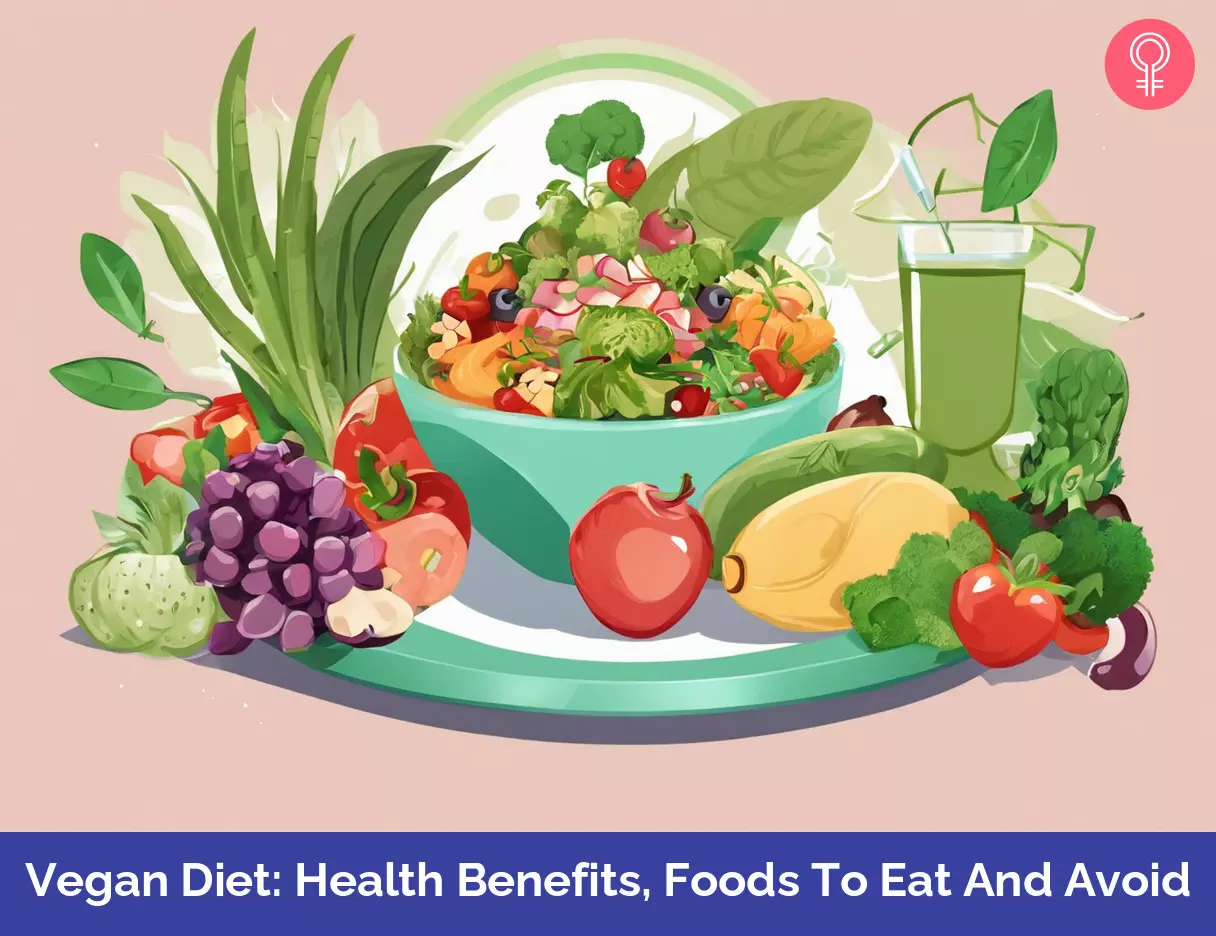
Image: Stable Diffusion/StyleCraze Design Team
Discover all you need to know about the vegan diet with this informative video. Check it out to figure out if this plant-based dietary approach is ideal for your fitness needs.
References
Articles on StyleCraze are backed by verified information from peer-reviewed and academic research papers, reputed organizations, research institutions, and medical associations to ensure accuracy and relevance. Read our editorial policy to learn more.
- Vegetarian or vegan diets and blood lipids: a meta-analysis of randomized trials
https://pubmed.ncbi.nlm.nih.gov/37226630/ - Plant-based diets and long-term health: findings from the epic-oxford study
https://www.ncbi.nlm.nih.gov/pmc/articles/pmc7613518/ - Vegetarian and vegan diets and the risk of cardiovascular disease, ischemic heart disease and stroke: a systematic review and meta-analysis of prospective cohort studies
https://www.ncbi.nlm.nih.gov/pmc/articles/pmc9899747/ - A systematic review of the association between vegan diets and risk of cardiovascular disease
https://pubmed.ncbi.nlm.nih.gov/33831953/ - Perspective: plant-based eating pattern for type 2 diabetes prevention and treatment: efficacy, mechanisms, and practical considerations
https://www.ncbi.nlm.nih.gov/pmc/articles/pmc8634508/ - The relationship between plant-based diet and risk of digestive system cancers: a meta-analysis based on 3,059,009 subjects
https://pubmed.ncbi.nlm.nih.gov/35719615/ - The impact of plant-based dietary patterns on cancer-related outcomes: a rapid review and meta-analysis
https://www.ncbi.nlm.nih.gov/pmc/articles/pmc7400843/ - Plant-based diet as a strategy for weight control
https://www.ncbi.nlm.nih.gov/pmc/articles/pmc8701327/ - Therapeutic benefits and dietary restrictions of fiber intake: a state of the art review
https://www.ncbi.nlm.nih.gov/pmc/articles/pmc9268622/ - Effect of plant-based diets on gut microbiota: a systematic review of interventional studies
https://www.ncbi.nlm.nih.gov/pmc/articles/pmc10057430/ - Plant-based diets and incident CKD and kidney function
https://www.ncbi.nlm.nih.gov/pmc/articles/pmc6500948/ - The use of portion control plates to promote healthy eating and diet-related outcomes: a scoping review
https://www.ncbi.nlm.nih.gov/pmc/articles/pmc8874720/ - The association between sleep health and weight change during a 12-month behavioral weight loss intervention
https://www.ncbi.nlm.nih.gov/pmc/articles/pmc7914147/ - Nutrient intake and status in adults consuming plant-based diets compared to meat-eaters: a systematic review
https://www.ncbi.nlm.nih.gov/pmc/articles/pmc8746448/ - The impact of a vegan diet on many aspects of health: the overlooked side of veganism
https://www.ncbi.nlm.nih.gov/pmc/articles/PMC10027313/ - Vegan diets: practical advice for athletes and exercisers
https://www.ncbi.nlm.nih.gov/pmc/articles/PMC5598028/
Read full bio of Eleana Kaidanian
Read full bio of Ravi Teja Tadimalla
Read full bio of Moksha Gandhi





